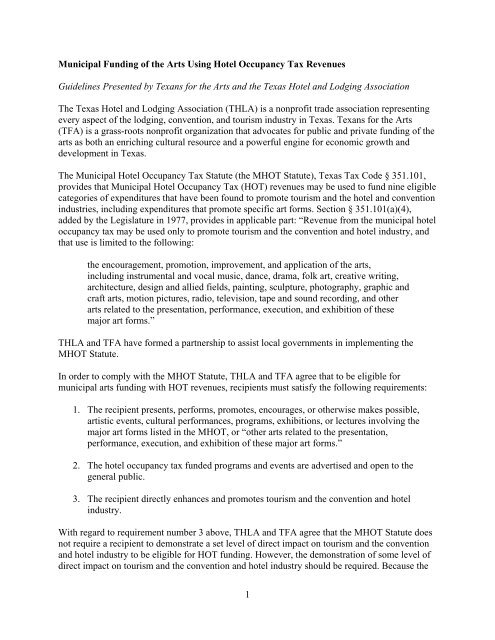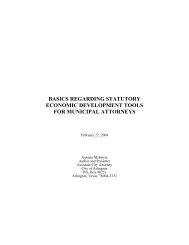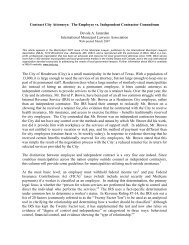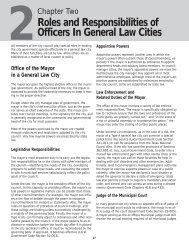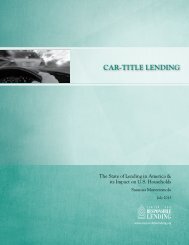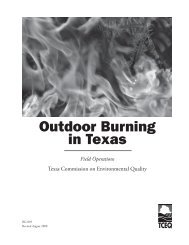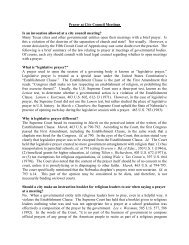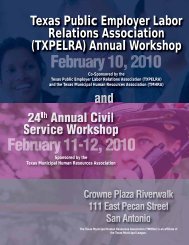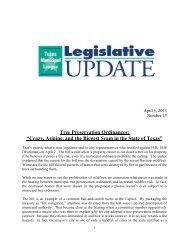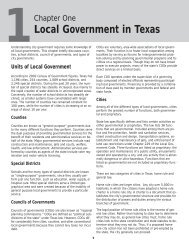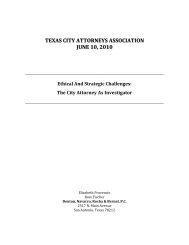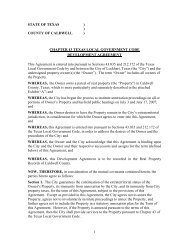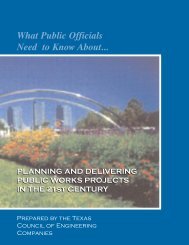Municipal Funding of the Arts Using Hotel Occupancy Tax Revenues
Municipal Funding of the Arts Using Hotel Occupancy Tax Revenues
Municipal Funding of the Arts Using Hotel Occupancy Tax Revenues
You also want an ePaper? Increase the reach of your titles
YUMPU automatically turns print PDFs into web optimized ePapers that Google loves.
<strong>Municipal</strong> <strong>Funding</strong> <strong>of</strong> <strong>the</strong> <strong>Arts</strong> <strong>Using</strong> <strong>Hotel</strong> <strong>Occupancy</strong> <strong>Tax</strong> <strong>Revenues</strong>Guidelines Presented by Texans for <strong>the</strong> <strong>Arts</strong> and <strong>the</strong> Texas <strong>Hotel</strong> and Lodging AssociationThe Texas <strong>Hotel</strong> and Lodging Association (THLA) is a nonpr<strong>of</strong>it trade association representingevery aspect <strong>of</strong> <strong>the</strong> lodging, convention, and tourism industry in Texas. Texans for <strong>the</strong> <strong>Arts</strong>(TFA) is a grass-roots nonpr<strong>of</strong>it organization that advocates for public and private funding <strong>of</strong> <strong>the</strong>arts as both an enriching cultural resource and a powerful engine for economic growth anddevelopment in Texas.The <strong>Municipal</strong> <strong>Hotel</strong> <strong>Occupancy</strong> <strong>Tax</strong> Statute (<strong>the</strong> MHOT Statute), Texas <strong>Tax</strong> Code § 351.101,provides that <strong>Municipal</strong> <strong>Hotel</strong> <strong>Occupancy</strong> <strong>Tax</strong> (HOT) revenues may be used to fund nine eligiblecategories <strong>of</strong> expenditures that have been found to promote tourism and <strong>the</strong> hotel and conventionindustries, including expenditures that promote specific art forms. Section § 351.101(a)(4),added by <strong>the</strong> Legislature in 1977, provides in applicable part: “Revenue from <strong>the</strong> municipal hoteloccupancy tax may be used only to promote tourism and <strong>the</strong> convention and hotel industry, andthat use is limited to <strong>the</strong> following:<strong>the</strong> encouragement, promotion, improvement, and application <strong>of</strong> <strong>the</strong> arts,including instrumental and vocal music, dance, drama, folk art, creative writing,architecture, design and allied fields, painting, sculpture, photography, graphic andcraft arts, motion pictures, radio, television, tape and sound recording, and o<strong>the</strong>rarts related to <strong>the</strong> presentation, performance, execution, and exhibition <strong>of</strong> <strong>the</strong>semajor art forms.”THLA and TFA have formed a partnership to assist local governments in implementing <strong>the</strong>MHOT Statute.In order to comply with <strong>the</strong> MHOT Statute, THLA and TFA agree that to be eligible formunicipal arts funding with HOT revenues, recipients must satisfy <strong>the</strong> following requirements:1. The recipient presents, performs, promotes, encourages, or o<strong>the</strong>rwise makes possible,artistic events, cultural performances, programs, exhibitions, or lectures involving <strong>the</strong>major art forms listed in <strong>the</strong> MHOT, or “o<strong>the</strong>r arts related to <strong>the</strong> presentation,performance, execution, and exhibition <strong>of</strong> <strong>the</strong>se major art forms.”2. The hotel occupancy tax funded programs and events are advertised and open to <strong>the</strong>general public.3. The recipient directly enhances and promotes tourism and <strong>the</strong> convention and hotelindustry.With regard to requirement number 3 above, THLA and TFA agree that <strong>the</strong> MHOT Statute doesnot require a recipient to demonstrate a set level <strong>of</strong> direct impact on tourism and <strong>the</strong> conventionand hotel industry to be eligible for HOT funding. However, <strong>the</strong> demonstration <strong>of</strong> some level <strong>of</strong>direct impact on tourism and <strong>the</strong> convention and hotel industry should be required. Because <strong>the</strong>1
MHOT provides no specific methodology for determining a recipient’s impact on tourism or <strong>the</strong>convention/hotel industry, each funding entity has <strong>the</strong> flexibility to consider a number <strong>of</strong> factors.The following factors may be beneficial to consider, but this list is nei<strong>the</strong>r exhaustive normandatory. Cities and counties using hotel occupancy tax may consider any or all <strong>the</strong> belowlisted factors or o<strong>the</strong>r factors that are appropriate for determining a recipient’s impact on tourismand <strong>the</strong> convention and/or hotel industry in a particular community:a. The recipient works with its area lodging operators and/or <strong>the</strong> convention and visitorbureau (CVB), ei<strong>the</strong>r independently or in conjunction with o<strong>the</strong>r local arts organizations,to promote local arts events through hotel concierge services, training <strong>of</strong> hotel staff, hotelor CVB lobby area exhibitions, flyers, or similar measures to better serve visitors to <strong>the</strong>area and encourage <strong>the</strong>ir extended stay in area hotels or a return to stay in area lodgingfacilities.b. The recipient provides entertainment to conventions, conference, and meetings <strong>of</strong>fered inits cities and towns at which attendees are drawn from both in and out <strong>of</strong> <strong>the</strong> region.c. The recipient uses local hotel and lodging facilities for galas, meetings, or o<strong>the</strong>r eventssponsored by <strong>the</strong> recipient, including <strong>the</strong> use <strong>of</strong> hotel dining facilities by <strong>the</strong>ir patronsboth pre and post events.d. The recipient books hotel rooms for visiting artists and <strong>of</strong>fers hotel related information toattendees <strong>of</strong> <strong>the</strong> organization’s hotel occupancy tax funded events.e. The recipient promotes or markets its events outside <strong>of</strong> <strong>the</strong> local area through standardmedia promotion or advertising; Web sites; mailing lists; local, regional, and nationallistings in publications and calendars; and use <strong>of</strong> social media and, where appropriate,includes a link to information about area hotels.f. The recipient produces its events in conjunction with or within <strong>the</strong> boundaries <strong>of</strong> aCultural and Fine <strong>Arts</strong> District established pursuant to Texas Government Code §444.031.g. The recipient, ei<strong>the</strong>r through audience or attendee questionnaires, polling, or hotel blockbooking codes, demonstrates that hotel guests, tourists, convention attendees, or o<strong>the</strong>rout-<strong>of</strong>-town visitors have attended its hotel tax funded events.h. A performance, exhibition, or o<strong>the</strong>r event sponsored by <strong>the</strong> hotel occupancy tax recipienthas been reviewed or o<strong>the</strong>rwise noted in a publication that circulates outside <strong>of</strong> <strong>the</strong>recipient’s local community, which helps promote tourism and hotel activity in <strong>the</strong> area.THLA and TFA share <strong>the</strong> goals <strong>of</strong> growing as advancing tourism and <strong>the</strong> convention andhotel industry through <strong>the</strong> promotion <strong>of</strong> <strong>the</strong> arts and <strong>the</strong> encouragement <strong>of</strong> attendance atartistic and cultural events by persons outside <strong>of</strong> <strong>the</strong> local community. To this end, THLAand TFA are in <strong>the</strong> process <strong>of</strong> creating joint programs that will make convention and hotelindustry resources available for marketing local artistic and cultural events to hotel guests2
and attendees prior to and during <strong>the</strong>ir visits to <strong>the</strong> local area. Similarly, local artistic andcultural event hosts will endeavor to partner with <strong>the</strong> area hotel and lodging industry and <strong>the</strong>convention and visitor bureau to enhance <strong>the</strong> potential impact <strong>of</strong> <strong>the</strong>ir hotel tax funded artsprograms on tourism and area hotel activity.THLA and TFA have provided <strong>the</strong>se guidelines to members, arts organizations, and HOTfunding entities in order to foster understanding <strong>of</strong> <strong>the</strong> MHOT Statute and to stimulatecollaboration between <strong>the</strong> local arts communities and <strong>the</strong> hotel and tourism industries. THLAand TFA will continue working toge<strong>the</strong>r to nurture mutual cooperation and understandingamong all partners invested in art, culture, and tourism.3


